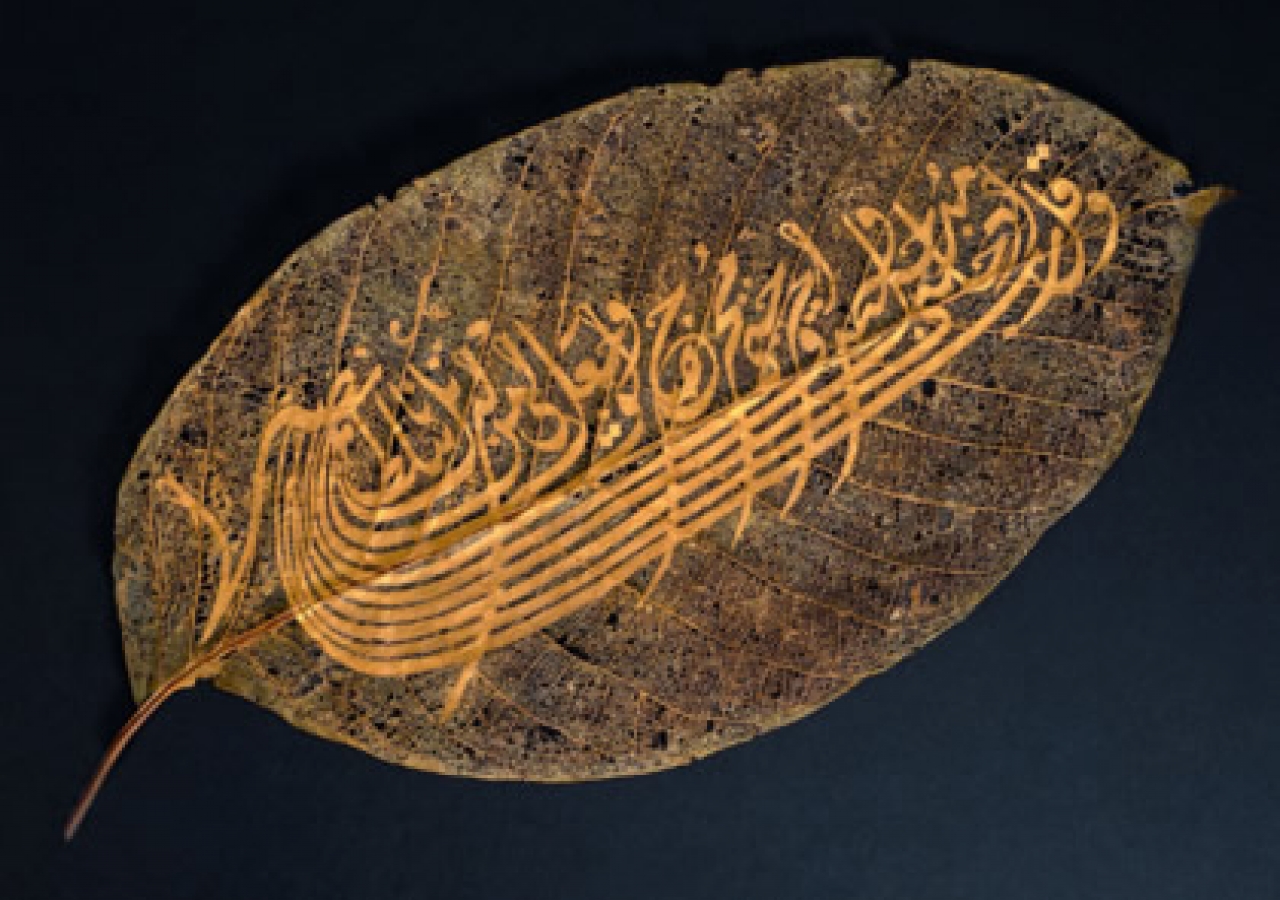During a visit to the Spirit and Life exhibition at the Ismaili Centre, London in July 2007, I was struck by the beauty and symbolism of a 19th century Turkish piece. The Arabic inscription on a leaf from a chestnut tree formed a canoe with oars. It reminded me of a story my father used to tell me about three travellers, striving to reach their destination. Each is equipped with a canoe to cross a river. The first traveller crosses the river with his canoe and upon realising there were no more rivers to cross, breaks the canoe apart and tosses it aside. The second traveller crosses the river and although he realises that the canoe is no longer needed, he hoists the canoe over his head and shoulders and continues onwards. The third traveller crosses the river with his canoe. He too realises that the canoe is no longer needed for the journey, but sends it back to bring others across.
The inscription and canoe story encourage reflection: How are we, as travellers going to equip our canoes and what we will do with them as we continue on our journey?
Alykhan and I both grew up in Kenya, and met while in university in Canada. We were married and are blessed with two wonderful children. As our lives unfolded, we asked ourselves how we should equip our canoe to ensure that it would bring us closer to our career and lifestyle goals but also be of use to others. We realised that continuous learning is likely one of the greatest tools to propel us forward. Beyond the enhancement of skills, we see that lifelong-learning has been a catalyst for us, introducing us to new opportunities and allowing us to meet the right people with whom to form partnerships and affiliations.
While practicing dentistry, I pursued waezeen training through the International Waezeen Training Programme, a programme of The Institute of Ismaili Studies and the national Ismaili Tariqah and Religious Education Boards. This experience sparked an interest in interfaith dialogue and led me to pursue a Masters degree in Education focusing on community development in interfaith programming. I then attended an Interfaith Youth Core conference in Chicago. The conference introduced me to like-minded individuals and opened my eyes to the opportunities and necessity of interfaith dialogue on a larger scale. I founded the IDEA (Interfaith Dialogue, Education and Action) Youth Initiative shortly thereafter. IDEA's vision is to help raise a generation of religious pluralists who are confident in their own religious identity, but realise that there exists a diversity of such identities and by coming to know them, we can find avenues to work together towards the common good.
Alykhan graduated as a general Internal Medicine specialist and then established a cardiovascular evaluation clinic in Calgary. Over time, he completed a Masters in Public Health from Harvard University, an MBA from the Wharton School, University of Pennsylvania, and became certified as a Physician Executive with the American College of Physician Executives. Beyond building a successful Internal Medicine clinic in Calgary, he has also worked with the University of Calgary to commercialise technology and volunteered with the Calgary Foundation to award grants for projects related to health and wellness.
Having come to understand the importance of strengthening our canoe and its oars through continuous education, we then committed to explore our common humanity by engaging in service projects. The projects were of local, national, and international scope. We chose projects for which our background and experiences would add unique value. One example is our decision to volunteer in Kenya this past summer. We participated in dental screenings, educational sessions, quality audits of healthcare institutions, and an evaluation of the health, education, and interfaith needs of a local community. What was surprising was that while we had travelled there with the intention to serve, we had underestimated the sense of fulfilment and growth that our family would derive from these projects.
Alykhan and I have often wondered how we would pass the canoe on to our children and how we would teach them to navigate around the turbulence that life seems to offer. Have we imparted upon them the values and skills to pursue success and to serve others? Our strategy for generational success is to model those behaviours that we wish our children to emulate, to engage them in our family's projects so that they can see and feel first-hand, the impact that they have, and to enlist them in deciding what we as a family will do next. We talk to them about goal setting, planning, budgeting, evaluation, and implementation, demonstrating how we rely on these skills for the work we do. And we will try to inspire a passion for knowledge and to empower them with the spirit of inquiry. Most importantly we try to instil in them humility and respect for others.
We have adopted the metaphor that our family's canoe is a gift, which needs to be cared for, enhanced and deployed so that it enriches us and those we can reach. When the time is right we must hand the oars over to others so that they can continue their journey.










